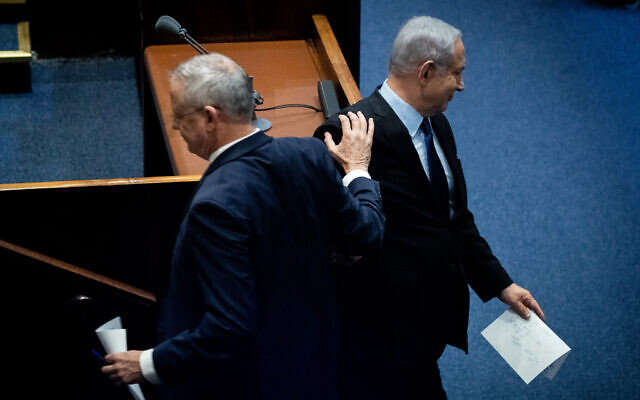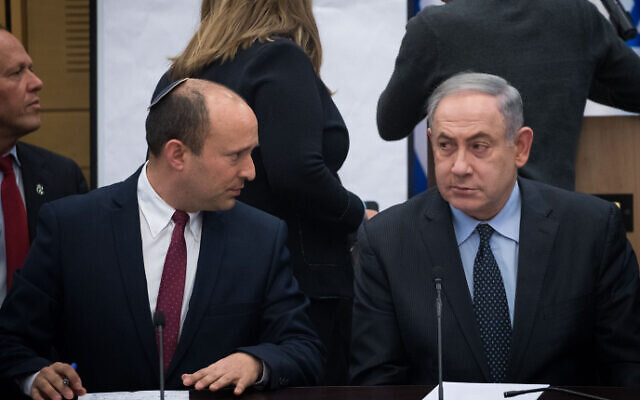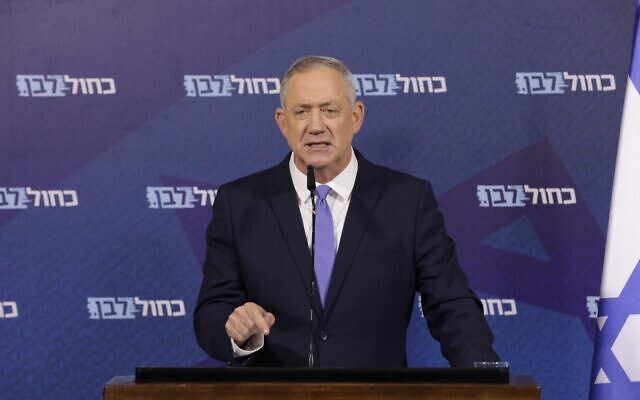Blue and White chief’s mandate extended to Wednesday midnight after Netanyahu joins request; teams reconvening Tuesday morning; Yamina sources say party set to bolt right-wing bloc

Prime Minister Benjamin Netanyahu and Blue and White leader Benny Gantz appeared to be on the cusp of reaching a coalition deal overnight Monday-Tuesday, as the president approved a last-minute joint request by the two to extend Gantz’s mandate to form a government by 48 hours, with the sides citing “major progress” in talks.
The request to the president was made just minutes before Gantz’s deadline to form a government expired at midnight, as the two leaders held a meeting at the Prime Minister’s Residence. President Reuven Rivlin quickly approved it, after previously rejecting a request by Gantz for a two-week extension when it was not supported by Netanyahu.
In a joint statement after their meeting, Netanyahu and Gantz said there had been “significant progress in talks to form an emergency unity government.” The meeting ended shortly after midnight, with the sides saying they would reconvene in the morning with their negotiating teams in tow.
There were no details on what compromises had been made, but Channel 12 news reported that Netanyahu’s allies in the Yamina Party were fuming over the agreements and were set to bolt to the opposition.
Sources in the party told the network Netanyahu was “ending the right wing block” and “stabbing religious Zionism in the back” by selling “the judicial system and [West Bank annexation] to the left.”
The Ynet news site further quoted unnamed officials in the party as saying it would split off from Netanyahu’s right-wing bloc.

“Netanyahu sold out the right to save himself, but he’ll swiftly discover that his new partners holding the Justice Ministry will throw him out on the street very quickly. When Blue and White boots him from [his residence], we won’t be there,” a party source was quoted as saying.
In a response statement, Likud rejected Yamina’s claims as “baseless” and said they were intended to foil the formation of an emergency government due to the party’s desire for more senior positions in the emerging coalition.
“The prime minister is a steadfast defender of the principals of the [right-wing] camp, as he always has been, and chief among them the application of sovereignty,” the statement said, in reference to annexation.
Even without Yamina’s six seats, Netanyahu could easily build a coalition with Blue and White’s support.
A main point of contention between the sides in recent days was believed to be Likud’s desire to make changes to judicial appointments procedures to allow it greater control over the process, and Blue and White’s stark opposition to this.
Yamina had previously claimed Netanyahu had promised that he wouldn’t budge on the matter.
Another key issue was reportedly Netanyahu’s concern that the High Court of Justice may rule that he cannot be prime minister due to the criminal charges against him, a development which could leave Gantz as prime minister for the whole term of their coalition. Netanyahu was therefore reportedly trying to engineer some kind of legislative guarantee that Gantz would not take over as prime minister in the event of such a court ruling.
As for annexation under the US peace plan, Gantz is believed to have withdrawn from his previous demand for a right of veto on the matter, essentially clearing the way for it to take place if it is approved by Washington.
Notably, the 48-hour extension left Netanyahu and Gantz with far less time than that to agree on a deal: Tuesday evening until Wednesday evening is the “Pesach Sheni,” or Second Passover, holiday, leaving little time for negotiations assuming the two do not hold talks during that time.
If the mandate were to end without the sides agreeing, Rivlin has indicated he would not give Netanyahu 28 days to try his hand at forming a government as well since he does not have 61 MKs recommending him. Instead, Rivlin said that if the two leaders do not sign an agreement, he would ask Knesset members to recommend one of their peers to receive the mandate to form a government. The first MK to receive more than 61 recommendations would then be tasked by Rivlin. If the Knesset cannot agree on a candidate within 21 days, Israel would have to hold fourth elections.

Gantz, in a televised address to the nation on Monday evening before his meeting with Netanyahu, had implored the premier to ink a coalition deal. He urged Netanyahu to honor the terms of an agreement which he said was finalized by both sides last week.
“A fair agreement was reached a few days ago… a fair division of the burden [that] put the good of the state ahead of all of our personal interests,” he said. “We have come to the moment of truth. The people of Israel expect us to put aside our differences and work together for them… History will not forgive us if we don’t get this done.”
Netanyahu, who had earlier in the evening again called publicly for a unity government, then promptly invited Gantz to his residence for further talks, which culminated in the late-night announcement of significant headway.
Three rounds of elections since last April a year have failed to break a political deadlock that has left the country with a transitional government of limited power. Following the last vote, on March 9, Rivlin tasked Gantz with forming a government after he received the backing of a majority of lawmakers to be nominated with the job.
He received the nomination with the backing of left-wing and Arab lawmakers, but then, late last month, proceeded to launch negotiations with Netanyahu, in a move that saw his Blue and White alliance break up. Gantz is seeking a unity government with Likud that would see him and Netanyahu rotate the premiership, with the incumbent prime minister keeping the reins for the first 18 months.
In his speech, Gantz argued that the Netanyahu-led caretaker government cannot deal with the challenges that the coronavirus crisis presents.
“Netanyahu and Likud know we are fair-minded partners,” he went on. “They also know there are some issues we cannot compromise over” — and first of all “the rule of law and the protection of democracy.”

In his address, Gantz did not make any accusations against Netanyahu’s handling of the negotiations and did not mention or hint at a reported threat that Blue and White has made to Likud.
Gantz is Knesset speaker with control over the parliamentary agenda. The threat looming over the coalition negotiations is that should Likud call off the talks, Gantz and his Blue and White MKs would rejoin the anti-Netanyahu bloc in passing legislation to prevent an indicted person — namely Netanyahu — from serving as premier.
The two sides have been working toward a power-sharing arrangement in which Netanyahu would remain prime minister for the coming 18 months, then rotate the position with Gantz. They were said to be close to a deal last week but then accused each other of introducing last minute alterations that prevented an agreement.
Israeli law requires cabinet ministers facing criminal indictment to resign from their cabinet posts, but there is no such stipulation for a prime minister.
Netanyahu faces seven counts of three criminal charges: fraud and breach of trust in Cases 1000 and 2000, and bribery, fraud and breach of trust in Case 4000. He denies the allegations and says he is the victim of an attempted political coup by the opposition, police and state prosecutors. His trial is scheduled to begin next month, though it remains unclear whether it will open then, due to the pandemic.
As reported by The Times of Israel
